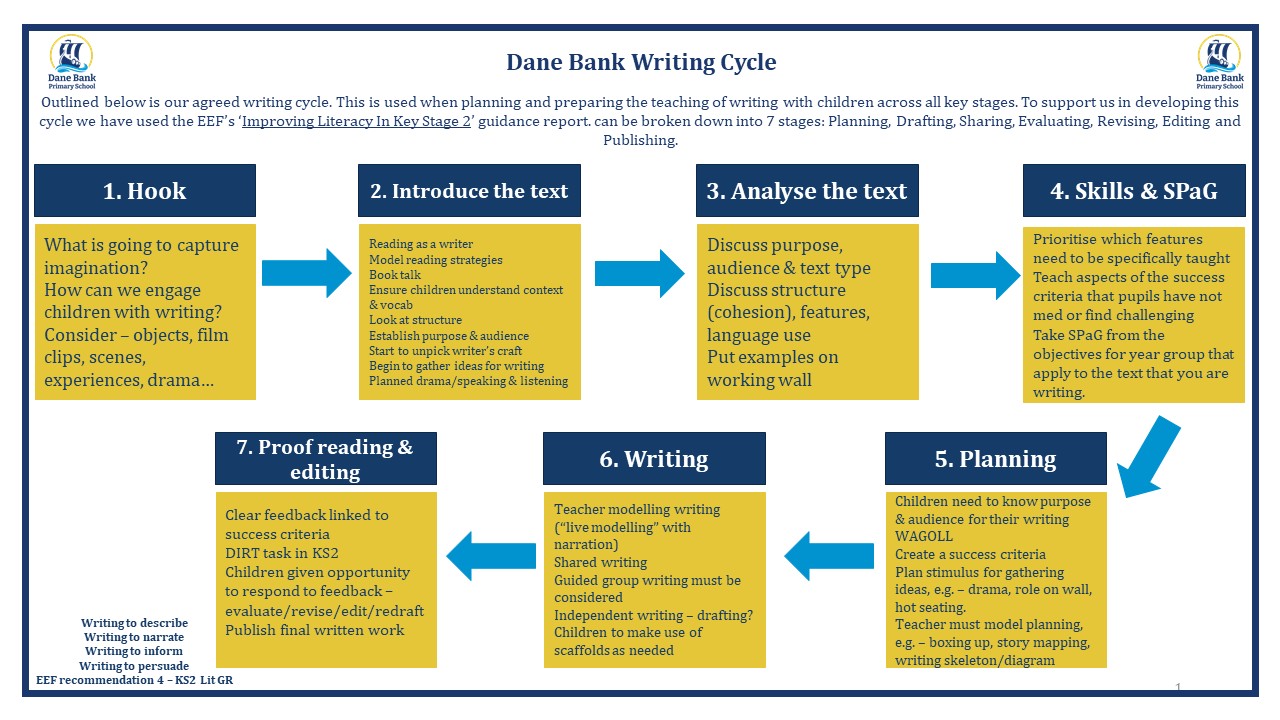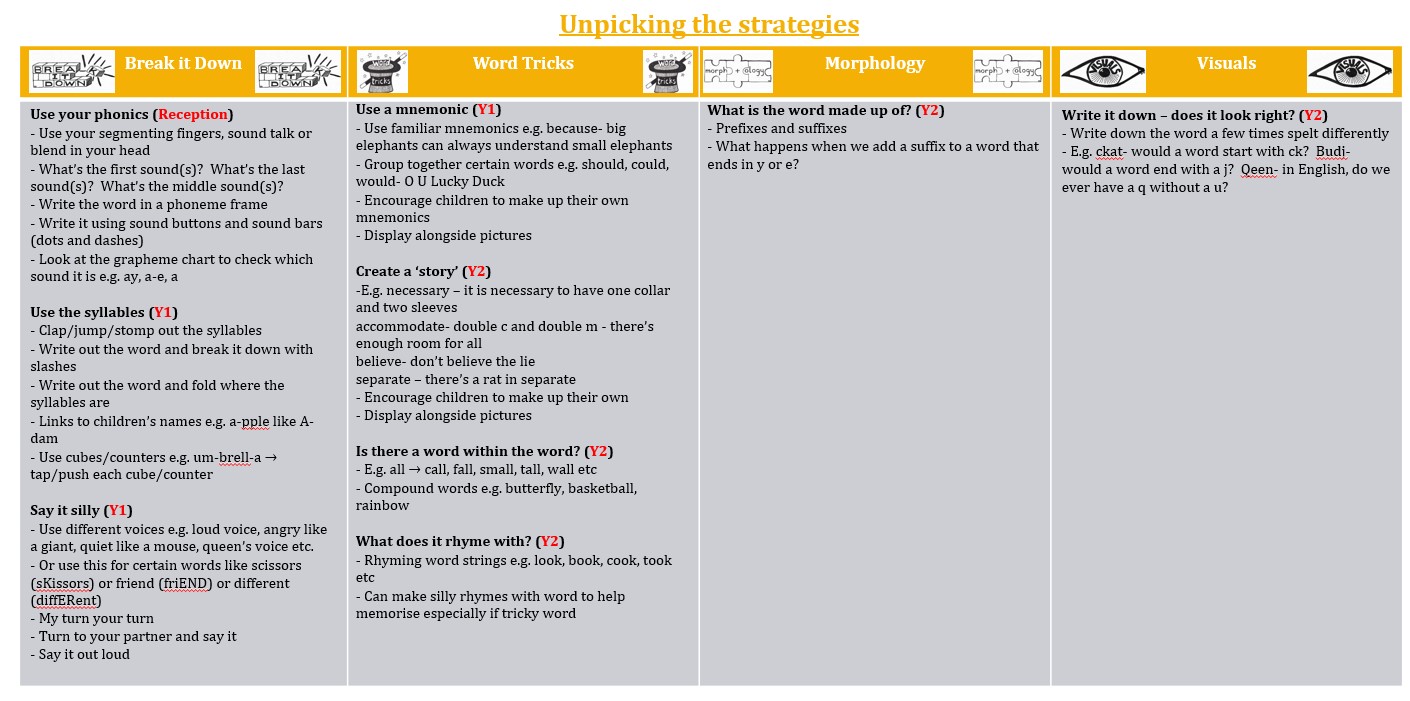English
Our English Curriculum for each year group can be accessed by clicking on the document links below:
Reading
Teachers model reading strategies during shared reading sessions within lessons and specific Guided Reading lessons. Class timetables also allow dedicated time for developing a love of reading through specific ‘reading for pleasure’ sessions where children can read independently, share books and discuss book recommendations and reviews. Staff also timetable opportunities to listen to pupils read individually where bespoke, individualised support can be offered – this is scheduled according to pupil needs to allow those children that need it to be given more regular support. A range of banded reading scheme books are used to support individual reading and our scheme has recently been extended to support pupils right through Key Stage 2 as well as with early reading.
Guided Reading is taught in Early Years with small groups of children. In Year 1, Guided Reading is taught using a carousel approach where pupils work with the teacher in a small group on one day and then spend time on subsequent days completing follow up work to develop reading skills and strategies. From Year 2 to 6, Guided Reading is taught using a whole class model. These whole class sessions are planned to link to the relevant content domain and develop essential reading skills such as; inference, vocabulary development, retrieval and sequencing.
Each class also has a ‘class story’ which the teacher reads to children at the end of each day. We use the Oxford Reading Scheme throughout school and recently extended our scheme to follow children all the way up n to Upper Key Stage Two. This allows us to ensure that children continue to develop their reading fluency and accuracy and develop secure skills to become lifelong readers.
We have worked hard to develop our school library. We have purchased a considerable amount of new books, developed the library environment and have a committed group of Pupil Librarians that support with the running of our library.
Our Reading Progression Framework gives an overview of the curriculum coverage and progression for teaching Reading from Early Years up to the end of Key Stage Two.
dane bank reading progression overview.pdf
7 Top Tips to Support Reading at Home
7 Top Tips to Support Key Stage 2 Children Reading at Home
Writing
We aim to develop the children’s ability to produce well-structured, detailed writing in which the meaning is made clear and which engages the interest of the reader. From Early Years to Year 6, teaching of writing is linked to a text. English Curriculum overview documents (links above) demonstrate the key texts for each year group and outline how opportunities for writing are planned from these starting points. Careful attention has been given to ensuring a range of text types and authors have been used which allow teachers to link teaching of formal structures of English, grammatical detail, punctuation and spelling. Elements of the Talk for Writing approach are incorporated in English teaching in Early Years and Key Stage 1 where pupils are given a text structure to learn and then adapt/innovate to create their own writing.
We have created our "Dane Bank Writing Cycle" to give an overview of how a unit of writing is taught from beginning to end.

Word Aware - Vocabulary Development
Word Aware is a structured, whole-school approach to promote the vocabulary development of all children. Focussed on whole class learning, the resource is of particular value for those who start at a disadvantage – including children with Developmental Language Disorder, Special Educational Needs and those who speak English as an additional language, but it will extend the word learning of all students.
As a school we have embraced the Word Aware approach to vocabulary development and this is part of our current School Development Plan.
You can find more information about the programme on the Word Aware website by clicking here.
Oracy
At Dane Bank Primary School, we understand the importance of oracy withing the entire curriculum. We know that, for our children to become successful learners, it is essential that we prioritise high-quality teaching of oracy skills alongside other curriculum objectives and priorities.
Our shared understanding of oracy is that it is the ability to articulate ideas, develop understanding and engage with others through spoken language. In school, oracy is a powerful tool for learning; by teaching students to become more effective speakers and listeners we empower them to better understand themselves, each other and the world around them. It is also a route to social mobility, empowering all students, not just some, to find their voice to succeed in school and life.
We have used the Voice 21 benchmarks to ensure we provide a high quality oracy education for our children and have worked with our Trust (CLiC Trust) to develop a Trust-wide Oracy Framework. In school, we have then taken that framework along with the progression in language structures materials and mapped oracy across our English curriculum. We have also considered how the oracy framework criteria run within our wider curriculum.

clic trust oracy framework dane bank.pdf
The elements from the Oracy Framework are also woven throughout the wider curriculum. The individual subject Oracy overviews can be seen on the subject pages, or below:
Spelling
At Dane Bank Primary School, we have designed our own, bespoke approach to the teaching of spelling from Reception up in to Key Stage Two. This approach takes in to account relevant research about effective teaching and learning; information and knowledge from our Little Wandle Phonics programme and what we know about metacognition and cognitive science. We have worked hard to include elements of Phonics teaching, e.g. – grapheme “grow the code” charts throughout Key Stage Two to encourage children to use their skills and knowledge to support their spelling skills.
We designed a programme to bring the teaching of Spelling more in-line with our metacognitive approach in all learning and therefore, created 4 main spelling strategies:
- Break it down
- Word Tricks
- Morphology
- Visuals.
We have mapped these strategies from Reception up to Year 6 to show how and when they are introduced to children. the aim is that by the time the children reach Upper Key Stage Two, they are familiar with and confident to use all 4 strategies as tools to support their independent spelling.
These strategies are based on research and evidence around effective teaching and learning, particularly the EEF Guidance Reports: Improving Literacy in Key Stage One/Two and Metacognition and Self-regulated Learning.
Our 4 spelling strategies are designed to be progressive and build in complexity. An overview of how these are mapped across the school is shown below – along with a brief summary of what these strategies may “look like” in practice.


Spelling Overviews : Years 1 – 6
Key Songs and Rhymes in Early Years and Year One
We are aware that learning songs and rhymes are a vital part of children’s early language and literacy development. Please click the image below to show the key songs and rhymes we have incorporated in to our curriculum to support this.
key songs and rhymes in eyfs and year.pdf

